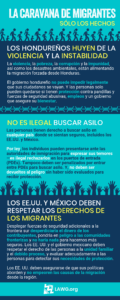Authors: Lily Folkerts, Andrea Fernández Aponte

This caravan isn’t a security threat. It’s a humanitarian crisis, and it will only get worse if the Trump Administration meets them at our southern border with a cold heart and a heavy hand. Seeking asylum is a right under U.S. and international law. And many members of this caravan are in need of protection because they’re fleeing from violence perpetrated by gangs and organized crime, as well as political repression, poverty, and environmental disasters. Yet this administration is hellbent on denying them their rights and limiting the rights of all asylum-seekers and migrants. Trump only sees the lives of those in this caravan as a tool to advance an anti-immigrant agenda and justify militarization. We see it as a call for American compassion and protection.
This page has all you need to understand how the caravan started and the root causes driving it. Get informed and share FACTS with your friends and family. Together, we’ll tell our government that we reject border militarization, welcome asylum-seekers, and demand protections for them!
Help us develop more resources on the caravan and the rights of migrants and refugees. Make a donation >>
Learn More
- Migrant Caravan: Answers to Your Most Pressing Questions
- Submission for IACHR Regional hearing: Human rights situation of the persons that make part of the Caravan of Migrants
- Between a Wall and a Dangerous Place
- Does My Story Matter? Seeking Asylum at Mexico’s Southern Border
Download our Infographic
See it here: ENGLISH | SPANISH
Spread the Word on Facebook & Twitter
Click to share:
![]()
![]()

What We’ve Done in D.C.
At the end of October, we lead a delegation to discuss the caravan with our partners. We were joined by Miroslava Cerpas Hernandez from the human rights organization CIPRODEH in Honduras. Miroslava accompanied the migrant caravan as a human rights observer as it left Honduras. She discussed causes and developments of the caravan:
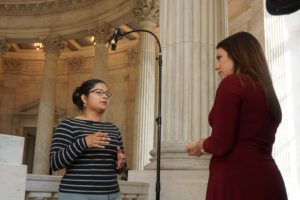 |
| Miroslava speaks with a reporter in the Capitol to dispel rumors about the caravan. Photo by Andrea Fernández Aponte. |
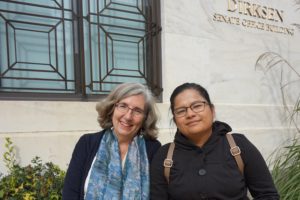 |
| LAWG Executive Director Lisa Haugaard (right) and Miroslava (left) outside Dirksen Senate Office Building before a day of congressional meetings. Photo by Andrea Fernández Aponte.
|
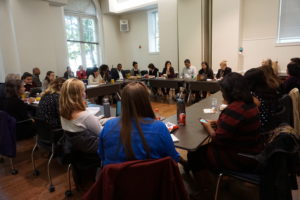 |
| Miroslava briefs civil society organizations on the caravan. Photo by Lily Folkerts. |
Our Trip to Mexico City, Observing the Caravan and Meeting with Partner Organizations
At the beginning of November, we traveled to Mexico City to meet with partners and speak with people in the caravan. We joined efforts by U.S. asylum lawyers and Mexican organizations at a sports complex, “Ciudad Deportiva,” a designated space for caravan members to rest and receive services before continuing their journey. Beyond immediate responses, we discussed with partners some long-term, transnational, and humane responses to the refugee crisis in the region.
Now, we are bringing this experience back to policymakers in D.C. and to our activists, like you:
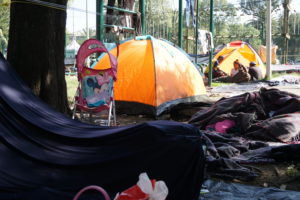 |
| Some individuals in the caravan had tents. Others made do with tarps and blankets hung up with rope and telephone wires. The Ciudad Deportiva is scattered with strollers, teddy bears, and other belongings of children and families. Photo by Lily Folkerts.
|
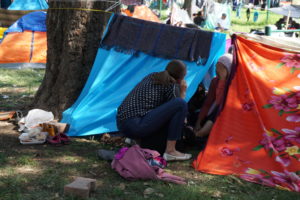 |
| LAWG staff, Daniella Burgi-Palomino, speaks with a single mother traveling with her three children. One of her daughters was convulsing throughout the route from Honduras, and she was unable to find medicine to treat it. The mother struggled to access the limited services at the Ciudad Deportiva and to protect her children. Photo by Lily Folkerts.
|
 |
| A young boy watches a street performer to pass the day. Although the site has small tents with psychological help and health services for children, they are insufficient to support the needs of even a fraction of the children in the caravan. Photo by Lily Folkerts.
|
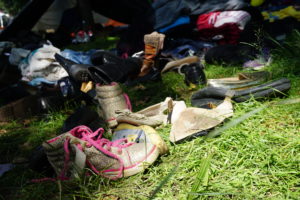 |
| Locals arrive with trash bags and cars full of clothes, shoes, and other donations. They dump these much needed resources in piles, and individuals in the caravan scramble to sort through them. Across Mexico, communities are providing the caravan with food and materials. Many individuals on the caravan have nothing and are thankful for these acts of solidarity. Photo by Lily Folkerts.
|
Presenting before the Inter-American Commission on Human Rights (IACHR) Regional Public Hearings
From December 1 – 7 the Inter-American Commission on Human Rights (IACHR) held its 170 Period of Sessions at its headquarters in Washington, D.C. Along with partner organizations, we spoke at the hearing titled, “Human rights situation of the persons that make up the Caravan of Migrants.” In addition to in-person contributions, participating organizations published “Submission for IACHR Regional hearing: Human rights situation of the persons that make part of the Caravan of Migrants.” See here for Spanish version.
.
We’re Working on Sharing More…
both with activists, like you, and policymakers in D.C. But all of this work takes resources. Something that our efficient but small team needs more of. Please consider making a donation to support our work to spread FACTs and TRUTHs about the migrant caravan.


